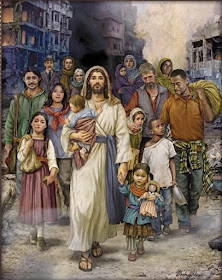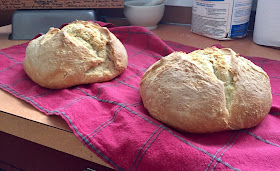I knew in that moment I should save it, but I was weary and a little blue. So I told myself, "I'll go back and get it later." And eventually when I did, of course, it was not to be found anywhere. Still you get the point: the love of God moves into creation through tender, bruised, uncertain and wounded individuals just like you and me. Not the elite or privileged, although they need grace as much as the rest of us, but ordinary women, men and children. The gospel of St. John puts it like this: God set up God's residence in the world smack in the middle of our neighborhood. Indeed, God became human flesh and blood, too so that we might more fully trust that our own flesh and blood is holy. That our bodies are beautiful temples of the sacred. That our lives truly matter. And they can give birth to joy, tenderness, healing and justice just like the Mother Mary. Jean Vanier of L'Arche goes on to say that in the love of Jesus we become sisters and brothers with God.
Not that I always experience this to be true, ok? I trust it as the deepest truth of
my faith, but I don't always feel it in my flesh. That's why the best spiritual friends and guides remind us that "we walk by faith, not sight." That is, we trust God's love for us more than any and all of our feelings. St. Paul wrote this for us in Romans 5: We have been united with God forever by faith, we have peace with God through our Lord Jesus Christ, who gives shape and form to grace... that is why we know that even in our suffering this isn't the end of the story: suffering produces endurance, and endurance produces character, character produces hope, and hope does not disappoint us, because hope is God’s love being poured into our hearts by the Holy Spirit. Our feelings come and go. They can confuse us at times as well as give us clues. But they are not the final truth - ever.
Writing about a new translation of The Cloud of Unknowing, the masterpiece of English mysticism, Bob Trube of Hearts and Minds Books first quotes the new text:
The first time you practice contemplation, you’ll only experience a darkness, like a cloud of unknowing. You won’t know what this is. You’ll only know that in your will you feel a simple reaching out to God. You must also know that this darkness and this cloud will always be between you and your God, whatever you do. They will always keep you from seeing him clearly by the light of understanding in your intellect and will block you from feeling him fully in the sweetness of love in your emotions. So be sure to make your home in the darkness.”
Then adds:
One of the critical themes running through the work, true to the apophatic tradition out of which it comes, is that God cannot be known with our minds but only in our love– we can’t think our way to God".... (nor can we) attain an experience of God through the senses, (we must) dismiss both our thoughts and feelings into a “cloud of forgetting"(for) longing for God is enough, this will open us to a deeper understanding (and encounter) of God.(see: https://bobonbooks.com/2018/11/28/review-the-cloud-of-unknowing/)
There's a lot swirling around inside of me right now - it may make its way into words sometime -or not. For now, let's stay with "longing for God is enough" and know that you are the beloved.





























